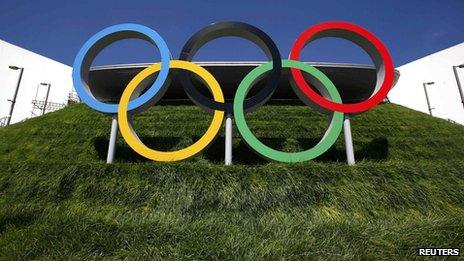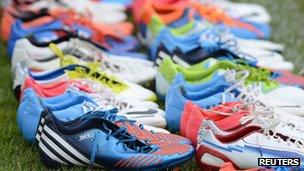Brands go for gold
- Published

Every symbol of the games is protected in law
Be careful how you use the words 'Glasgow', 'summer 2014', or 'Commonwealth Games', or indeed 'gold', 'silver' and 'bronze'.
The Dear Green Place is getting dearer, in that a fine for misuse of the protected names could come to £20,000.
It's not just the Olympics in London this summer (I've just broken three trademark rules and I'm not yet half way through this sentence, but hope to get away with it) that have apparently draconian protection around the commercial rights to associate yourself with the events.
In a couple of years time, logo enforcers designated by the Commonwealth Games organisers, as well as police officers, will be pursuing those who infringe its logo and sponsorship rights.
They have powers under the Glasgow Commonwealth Games Act 2008.
The Scottish government hasn't yet said what's to be outlawed, but it started consulting last April, and will have to tell us within six months of the Games starting.
The powers are expected to be effective from two weeks before the games until five days after; 9 July to 8 August 2014.
Commonwealth Games ticket touting has also been banned in Scotland, and that was extended last week to England and Wales by the UK Government.
Olympi-cynicism
As torch-relayed Olympimania competes with G4S-fuelled Olympicynicism, the commercial powers vested in the games organisers appear to be somewhat at odds with the Olympic ideal.

Branding has become an important part of every sports event
Lord Coe couldn't say last week if visitors to the Olympic Park (or Hampden Park for the football) would be turned away for wearing a T-shirt with the Pepsi logo, when its rival, Coca-Cola, is a long time partner of the Olympics.
Nor could he say what would happen to those wearing Nike trainers, when its rival, Adidas, is a sponsor.
International Olympics supremo Jacques Rogge has stepped in to reassure that the logo police won't be too heavy-handed.
Guerilla marketing
The problem they face is that a combination of British defiance, social media and a strong streak of anti-corporate sentiment through this part of the downturn, are making it easier for individuals to take part in a collective protest at the levels of control being required by Games organisers and by their sponsors.
In past times, the presence of global brands alongside your sport was simply accepted as the price to be paid to see world class performance.
But guerilla marketing has become one of the games to be played.
As a sponsorship expert told me for this week's edition of 'Business Scotland, on BBC Radio Scotland, the mineral water sponsor of the London Marathon has good reason to feel a bit unhappy when its rival turns up and starts handing out bottles.
Nike once took an entire building next to an Adidas-sponsored event, and plastered it with the company's swoosh and its colours.
Apparently, it's even easier to use guerilla tactics online, using social media.
Trademark tiffs
There is, after all, a good reason for all this. The Olympics has secured somewhere around £700m in sponsorship.
The really big global brands aren't even contracted to the London organisers. They've got multi-year deals with the International Olympic Committee in Lausanne.
That money's required to avoid all the cost of the games falling on the taxpayer or the broadcasters.
And to make it attractive to commit, the sponsors need to know their commercial rivals won't pass themselves off as linked to the events.
That mainly applies to big corporate entities, but much smaller ones can get caught up.
Going logo
On Monday, precisely two years from the opening ceremony of the Commonwealth Games in Glasgow, the organisers will name their seventh sponsor.
So far, the headline ones are Longines, the watchmaker, and SSE, the power utility.
The energy company has brands in Scotland, England and Wales (Scottish Hydro, Southern Electric and Swalec) and it's sponsoring each of these countries' teams in the Commonwealth Games.
I was surprised, however, to learn for this week's programme how little of the detail has been worked out.
The SSE talk is about linking to grass roots, and offering access to tickets for customers and, crucially, for staff engagement.
I also learned that Scotland's sports organisations are expressing frustration that the logo protection is extending to them.
They were recently invited to an event where the Commonwealth Games organisers urged them to build up promotion of the games, but won't allow them to use the logo on their websites or published material.
Lacking headquarters
Aside from the big Olympic and Commonwealth events, Paul Goodwin told me that his job of matching up sports in Scotland with sponsors is not only hard because the downturn has depleted sponsorship budgets; it's also hard because of the lack of Scottish headquarters for Scottish brands.
Getting sponsorship commitment from distant headquarters is much tougher than getting a direct connection close to home.
That helps explain why the Communities Cup is now funded through the Scottish Government. And it raises concerns within football that the fall-out from the Rangers liquidation is going to drive other sponsors away, particularly if TV exposure is reduced.
With Melbourne-headquartered Clydesdale Bank in retreat and troubled, it'll be a hard sell to retain its sponsorship of the Scottish Premier League.
Still, the makers of Irn Bru, A.G. Barr, must be pretty pleased with the exposure it's getting for its support of the Third Division.
You can hear about sport sponsorship on Business Scotland on BBC iPlayer and by free download.